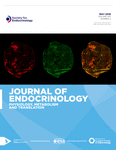Vitamin D is crucial for maternal care and offspring social behaviour in rats
- Nathanael J Yates1,
- Dijana Tesic1,
- Kirk W Feindel2,
- Jeremy T Smith1,
- Michael W Clarke3,
- Celeste Wale1,
- Rachael C Crew1,
- Michaela D Wharfe1,
- Andrew J O Whitehouse4 and
- Caitlin S Wyrwoll1⇑
- 1School of Human Sciences, The University of Western Australia, Perth, Australia
- 2Centre for Microscopy, Characterisation and Analysis, The University of Western Australia, Perth, Australia
- 3Metabolomics Australia, Centre for Microscopy, Characterisation and Analysis, The University of Western Australia, Perth, Australia
- 4Telethon Kids Institute, The University of Western Australia, Perth, Australia
- Correspondence should be addressed to C S Wyrwoll: caitlin.wyrwoll{at}uwa.edu.au
Abstract
Early life vitamin D plays a prominent role in neurodevelopment and subsequent brain function, including schizophrenic-like outcomes and increasing evidence for an association with autism spectrum disorder (ASD). Here, we investigate how early life vitamin D deficiency during rat pregnancy and lactation alters maternal care and influences neurodevelopment and affective, cognitive and social behaviours in male adult offspring. Sprague–Dawley rats were placed on either a vitamin D control (2195 IU/kg) or deficient diet (0 IU/kg) for five weeks before timed mating, and diet exposure was maintained until weaning of offspring on postnatal day (PND) 23. MRI scans were conducted to assess brain morphology, and plasma corticosterone levels and neural expression of genes associated with language, dopamine and glucocorticoid exposure were characterised at PND1, PND12 and 4 months of age. Compared to controls, vitamin D-deficient dams exhibited decreased licking and grooming of their pups but no differences in pup retrieval. Offspring neurodevelopmental markers were unaltered, but vitamin D-deficient pup ultrasonic vocalisations were atypical. As adults, males that had been exposed to vitamin D deficiency in early life exhibited decreased social behaviour, impaired learning and memory outcomes and increased grooming behaviour, but unaltered affective behaviours. Accompanying these behavioural changes was an increase in lateral ventricle volume, decreased cortical FOXP2 (a protein implicated in language and communication) and altered neural expression of genes involved in dopamine and glucocorticoid-related pathways. These data highlight that early life levels of vitamin D are an important consideration for maternal behavioural adaptations as well as offspring neuropsychiatry.
- Received 8 February 2018
- Accepted 28 February 2018
- Made available online as an Accepted Preprint 20 March 2018
- © 2018 Society for Endocrinology











